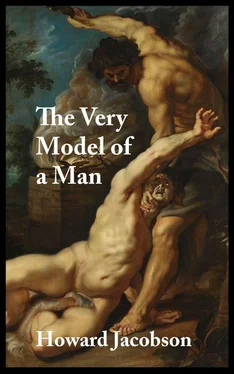After which there was not much either of us could say to the other for many days, or, if you prefer to count in carcasses, for the time it took to hack and dismember a whole family of spotless ruminants — father, mother, sons, brothers.
Although my parents’ zest for helping out with offerings was no longer the eager thing it had been when Saraqael burned among us, keeping us fired with promises of praise that were never once fulfilled, they still welcomed any physical remission from the torpor their unpeopled existence had become. At its best their contribution had always been confined to the associated fuss of burnt-oblation — altar-building, secondary ingredient collection, unspecific all-round encouragement to the officiant (such as washing him) — and these duties they could pick up or leave alone as the fancy took them, without serious consequences for Abel’s ministry. He kept brimming oil jars by his altar. And jeroboams of olibanum. And firewood stacked high like the ziggurats of Babel, out-topping conceivable need. He was a priesthood entire unto himself, and had my parents not attended him for a year he would have remitted nothing in his panderings to the Ever Hungry One. But they wanted to feel useful. If Abel noted that his store of flour was running low — that is to say, that in fourteen months, allowing for a plague of rats, it would be gone — my mother hastened to mill him another hundred homers. If he believed it was time to treat Yahweh to a fowl, he had only to mention it and Adam would be off and back again in a trice, with a young pigeon flapping under his great arm, or a turtle dove, which he pretended to have palmed clean out of the air, struggling for breath inside his gown. Off with its head, Abel would say, and my father, wreathed in the smiles of the effective, would attack the bird’s neck with his finger-nail until he had severed through to its gullet and windpipe. So adept had he become at this that it takes me longer to say it than it took him to do it. Nip, shriek, smile — not the bird, my father — spurt, and off. By which time Abel was ready with his blessing.
There was not always, though, such a happy meeting of inclination and prescription. Some ceremonies bogged down, grew tense and even argumentative for the simple reason that Saraqael’s instructions were not as foolproof as he’d intended them, and left too much scope for that individual interpretation which is the death of all religions. How big a handful, for example, did a handful of fine flour signify? A hand as my father understood and possessed such a measure was not a hand according to my mother’s daintier comprehension of the term. And even when agreement had been reached or compromise conceded on the brute issue of size, that still left unresolved the question of whether a handful was a handful heaped or a handful flat.
Do words mean anything or not? my father asked. He sounded exhausted, at his wit’s end before the argument had begun.
He took our silence as a signal that we concurred, that words did indeed mean something. Then if the angel had meant flat, he stormed, the angel would have said flat!
And if he’d meant heaped, my mother insisted, he would have said heaped.
My father held out his claw-hammer hands — behold, empty, a reasonable man. Full! he shouted. Hand full!
As a matter of course my mother winced beneath his empty violence. A hateful drooping of the neck and of the spirits, a dumb-show of weariness and martyrdom, but also an indication of adversarious stubbornness, fixed for all time.
Saraqael didn’t say hand full, she countered, he said handful — there’s a difference.
What difference? Show me how it’s different.
You know it’s different.
Show me — show me how it’s different.
She closed her eyes, as though to blind herself to his shouting, since it didn’t please the Almighty to make her deaf to it.
It’s different, she said, because it implies what a hand can naturally hold, not what a hand can be made to hold. Saraqael — Saraqael, Saraqael, Saraqael: she still had not stopped naming him — Saraqael was not setting us a test. He was not asking you to prove that you can balance half the universe in your hand.
Adam looked to his younger son for a refutation of this. Tell her, his glance implored, tell her that she has never had a single true thought in her life.
But Abel never decided between disputants. He would sooner have plunged up to his shoulders in entrails. I agree with both of you, he said. The ruling’s ambiguous.
Adam looked to me, positioned as was my wont now, at a suspicious distance from the altar and its attendants, like a snake outside a ring of fire, contemptuous but transfixed. It must have been an evening service because I remember the sun sitting like a bubble of blood on the point of the grassless mountain my father and I no longer visited. The Creator had taken to stretching out our evenings interminably, pleased with the succulence of what reached Him as long as it stayed light. Sometimes, in order to extend His enjoyment, He would halt the sun in its decline and hurl it back into the sky. On this occasion He kept it bouncing on the pinnacle while we quibbled over flour. You could hear the earth ticking with His waiting. The sky throbbed above us, flecked, taut, attenuated, like a stretched nerve.
My father was still waiting too. Go on — tell her, tell her, tell her she has never once been right…
I agree with neither of you, I said. Saraqael, may his name be soon forgotten, said the handful should be brought — that is to say, carried; but you cannot carry, without spilling it, an open palmful, heaped or flat. Therefore he must have intended us to understand, whatever can be carried in a closed fist. Not that I care.
A closed fist? My father had never heard anything so ludicrous. A closed fist? What — like one of these!?
My mother saw no merit in the suggestion either. She clicked her teeth at me. Treated me to the family jeer. Showed me how my own mouth wanted to go. How it would go if I didn’t move heaven and earth to stop it. Closed fist? I’m not having that, she said.
Ha, said Adam.
Tst, said Eve.
S… nap! went the sky.
Truly, I sometimes think I must have been a messenger from the God of Hymenaic Bliss Himself, so reliably did I harmonise my unhappy warring parents with themselves, with each other, and with short-tempered nature.
And yet they thought Abel was the loving one.
The important thing, he said to me, a week or two after the disagreement over greed and envy we never had — the important thing is to give something away.
I tossed a stone at him. Like that?
Something that’s your own.
I plucked a hair from my head. Like that?
Something you value.
I looked about me. You have me there, I said.
I wearied him. He never once began a conversation with me that he did not ultimately regret. He must have vowed a thousand times that he would not speak, or at least not initiate a discussion, again. But I was always able to lure him into talk, though talk was not his medium, by seeming to have mended my ways, by appearing to be curious this time, finally, at last, once and for all, to hear what he had to say. Then the moment he opened his mouth I would look away, feigning boredom or disgust.
It was his discomfiture that I was after. Not because I was callous and enjoyed the sight of suffering, but because his distress was my excuse for remorse. This is what happens when you love your pretty brother to excess: you need to bruise him so that you can kiss him better.
And all the time he thought we were discussing God.
What I mean when I say it’s important to give something away, he persisted, is that it’s necessary to let something go.
What’s the difference? (I could sound like my father when I needed to.)
Читать дальше











